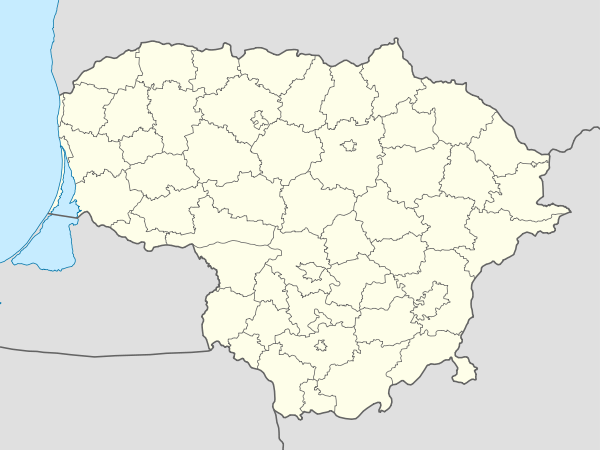Alanta
| Alanta | |
|---|---|
|
St. Jacob's church in Alanta | |
| Nickname(s): Alunta | |
 Alanta Location of Alanta | |
| Coordinates: 55°21′N 25°17′E / 55.350°N 25.283°ECoordinates: 55°21′N 25°17′E / 55.350°N 25.283°E | |
| Country |
|
| Ethnographic region | Aukštaitija |
| County |
|
| Municipality | Molėtai district municipality |
| Elderate | Alanta elderate |
| Seat of | Alanta elderate |
| First mentioned | 1436 |
| Population (2001) | |
| • Total | 450 |
| Time zone | EET (UTC+2) |
| • Summer (DST) | EEST (UTC+3) |
Alanta (dialectal Aukštaitian name Alunta) is a small town in Molėtai district municipality, Lithuania. It is the administrative seat of the Alanta Elderate. According to a census in 2001, Alanta had 464 residents. It is situated at the crossing of two roads: Molėtai–Anykščiai and Utena–Alanta–Ukmergė. The town's St. Jacob's church was built in 1909.
Etymology of the name
The name of the town is derived from the Alanta River, tributary of Virinta. The name of the river is derived from an ancient Lithuanian verb "alėti", which means 'to stream merrily' or 'to run'.
History
In 1436, Sigismund Kestutaitis granted Alanta to Kristinas Astikas to commend him for his aid in defeating Švitrigaila in the Lithuanian Civil War (1431–1435). In the 16th century, the town's Catholic church was built, and in 1581 the Grand Duke of Lithuania Stefan Batory gifted Alanta to Gáspár Békés (Lithuanian: Kasparas Bekešas), a Hungarian general. After 1598 the town belonged to Radziwiłł family and from 1828 until the World War I it belonged to the Pamarnacki family. From the 18th century to the Lithuanian revolt in 1863 Alanta had a parish school.
Alanta suffered heavily from many wars, including Napoleon's invasion of the Russian Empire, World War I and World War II, because of its location on the crossing of two important roads.
Alanta has a rare, surviving wooden synagogue.[1]
Palace of Alanta estate

The palace of the estate, which houses a library and an ethnographic museum, has been renovated and its park trimmed. The founder of the Alanta library, Elvyra Satkūnaitė, was named "The best librarian of Lithuania" in 1996.
References
- ↑ Center for Jewish Art (2004). "Preserved Wooden Synagogues in Lithuania". The Hebrew University of Jerusalem. Retrieved on December 17, 2008. http://cja.huji.ac.il/Architecture/Wooden-synagogues-Lithuania.htm
External links
- (Lithuanian) Website of Alanta
- The estate of Alanta before renovation

